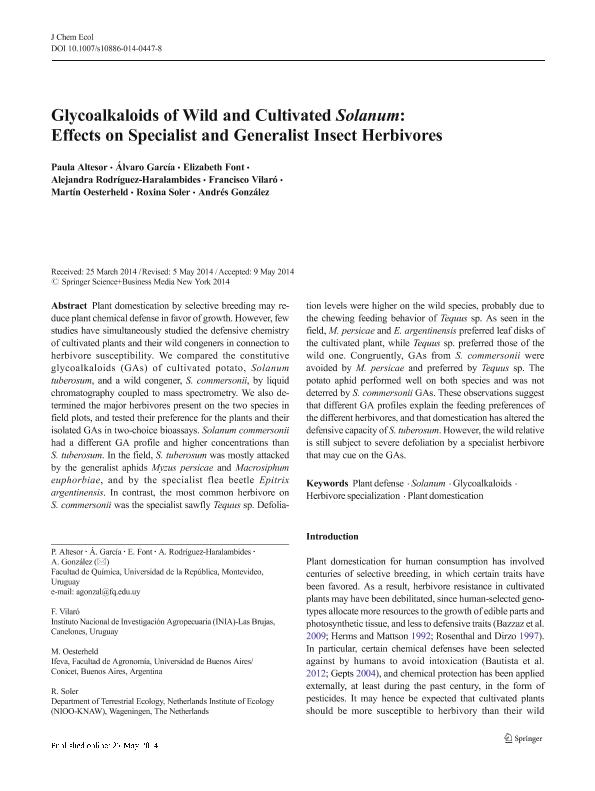Artículo
Glycoalkaloids of Wild and Cultivated Solanum: Effects on Specialist and Generalist Insect Herbivores
Altesor, Paula; García, Álvaro; Font, Elizabeth; Rodríguez Haralambides, Alejandra; Vilaró, Francisco; Oesterheld, Martin ; Soler, Roxina; Gonzalez, Andres Ramiro
; Soler, Roxina; Gonzalez, Andres Ramiro
 ; Soler, Roxina; Gonzalez, Andres Ramiro
; Soler, Roxina; Gonzalez, Andres Ramiro
Fecha de publicación:
05/2014
Editorial:
Springer
Revista:
Journal of Chemical Ecology
ISSN:
0098-0331
Idioma:
Inglés
Tipo de recurso:
Artículo publicado
Clasificación temática:
Resumen
Plant domestication by selective breeding may reduce plant chemical defense in favor of growth. However, few studies have simultaneously studied the defensive chemistry of cultivated plants and their wild congeners in connection to herbivore susceptibility. We compared the constitutive glycoalkaloids (GAs) of cultivated potato, Solanum tuberosum, and a wild congener, S. commersonii, by liquid chromatography coupled to mass spectrometry. We also determined the major herbivores present on the two species in field plots, and tested their preference for the plants and their isolated GAs in two-choice bioassays. Solanum commersonii had a different GA profile and higher concentrations than S. tuberosum. In the field, S. tuberosum was mostly attacked by the generalist aphids Myzus persicae and Macrosiphum euphorbiae, and by the specialist flea beetle Epitrix argentinensis. In contrast, the most common herbivore on S. commersonii was the specialist sawfly Tequus sp. Defoliation levels were higher on the wild species, probably due to the chewing feeding behavior of Tequus sp. As seen in the field, M. persicae and E. argentinensis preferred leaf disks of the cultivated plant, while Tequus sp. preferred those of the wild one. Congruently, GAs from S. commersonii were avoided by M. persicae and preferred by Tequus sp. The potato aphid performed well on both species and was not deterred by S. commersonii GAs. These observations suggest that different GA profiles explain the feeding preferences of the different herbivores, and that domestication has altered the defensive capacity of S. tuberosum. However, the wild relative is still subject to severe defoliation by a specialist herbivore that may cue on the GAs.
Archivos asociados
Licencia
Identificadores
Colecciones
Articulos(IFEVA)
Articulos de INST.D/INV.FISIOLOGICAS Y ECO.VINCULADAS A L/AGRIC
Articulos de INST.D/INV.FISIOLOGICAS Y ECO.VINCULADAS A L/AGRIC
Articulos(SEDE CENTRAL)
Articulos de SEDE CENTRAL
Articulos de SEDE CENTRAL
Citación
Altesor, Paula; García, Álvaro; Font, Elizabeth; Rodríguez Haralambides, Alejandra; Vilaró, Francisco; et al.; Glycoalkaloids of Wild and Cultivated Solanum: Effects on Specialist and Generalist Insect Herbivores; Springer; Journal of Chemical Ecology; 40; 6; 5-2014; 599-608
Compartir



